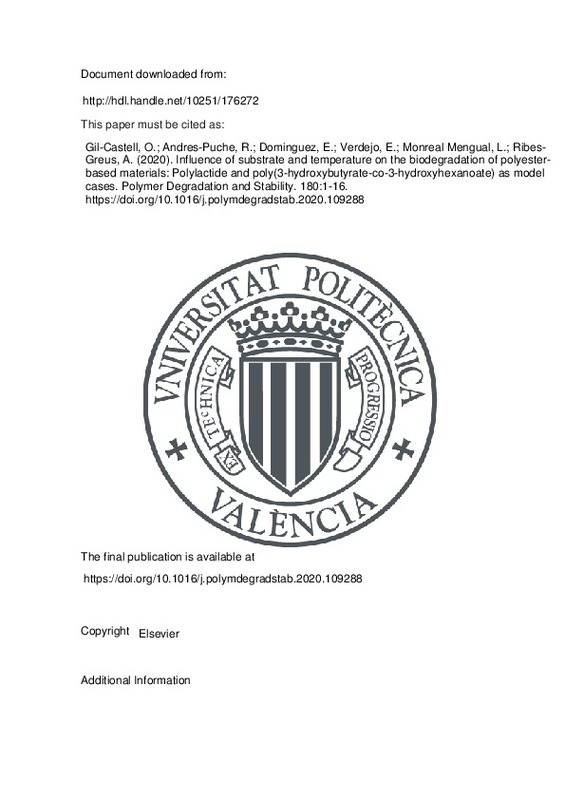JavaScript is disabled for your browser. Some features of this site may not work without it.
Buscar en RiuNet
Listar
Mi cuenta
Estadísticas
Ayuda RiuNet
Admin. UPV
Influence of substrate and temperature on the biodegradation of polyester-based materials: Polylactide and poly(3-hydroxybutyrate-co-3-hydroxyhexanoate) as model cases
Mostrar el registro sencillo del ítem
Ficheros en el ítem
| dc.contributor.author | Gil-Castell, O.
|
es_ES |
| dc.contributor.author | Andres-Puche, R.
|
es_ES |
| dc.contributor.author | Dominguez, E.
|
es_ES |
| dc.contributor.author | Verdejo, E.
|
es_ES |
| dc.contributor.author | Monreal Mengual, Llucía
|
es_ES |
| dc.contributor.author | Ribes-Greus, A.
|
es_ES |
| dc.date.accessioned | 2021-11-05T14:07:07Z | |
| dc.date.available | 2021-11-05T14:07:07Z | |
| dc.date.issued | 2020-10 | es_ES |
| dc.identifier.issn | 0141-3910 | es_ES |
| dc.identifier.uri | http://hdl.handle.net/10251/176272 | |
| dc.description.abstract | [EN] The extended use of polymers from renewable resources such as aliphatic polyesters or polyhydroxyalkanoates boosted the necessity to understand their behaviour in an end-of-life scenario. Although they can be degraded in reasonable shorter times than traditional polymers, understanding the degradation mechanisms under dissimilar conditions will contribute to further developments in this field. This work aimed to study the effect of temperature and substrate in the degradation of polylactide (PLA) and poly(3-hydroxybutyrate-co-3-hydroxyhexanoate) (PHBH) in a simulated laboratory scale to ascertain their contribution, separately or in combination. For this purpose, nine parallel degradation assays were performed by means of the combination of mesophilic (25 °C), thermophilic (58 °C) and hyperthermophilic (80 °C) temperatures with enriched synthetic medium, compost and standardised soil substrates. Although the analysis of the surface morphology, the thermal properties and the thermo-oxidative stability revealed changes as a function of time, the evaluation of the molar mass allowed for a more precise determination of the degradation. In general, chain scission was perceived in all cases as a function of time. The effect of temperature was critical, significantly more important than the effect of the substrate, which showed a less significant contribution, especially in terms of molar mass reduction. While for the PLA, biodegradation at 58 °C and thermal degradation at 80 °C resulted in similar consequences, for the PHBH the hyperthermophilic temperature of 80 °C was the most severe condition, regardless of the substrate. From a technological perspective, it may be highlighted that biodegradation at 58 °C may be the most cost-effective condition due to the lower energy supply required and the valuable contribution of the microorganisms. | es_ES |
| dc.description.sponsorship | The authors would like to thank the support of the Spanish Ministry of Science, Innovation and Universities, for the POLYDECARBOCELL project (ENE2017-86711-C3-1-R) and the Chilean Economic Development Agency (CORFO) for the project 13CEI2-21839. | es_ES |
| dc.language | Inglés | es_ES |
| dc.publisher | Elsevier | es_ES |
| dc.relation.ispartof | Polymer Degradation and Stability | es_ES |
| dc.rights | Reconocimiento - No comercial - Sin obra derivada (by-nc-nd) | es_ES |
| dc.subject | Biodegradation | es_ES |
| dc.subject | Biomaterial | es_ES |
| dc.subject | Polyester | es_ES |
| dc.subject | Substrate | es_ES |
| dc.subject | Thermal degradation | es_ES |
| dc.subject | PLA | es_ES |
| dc.subject | PHBH | es_ES |
| dc.subject.classification | CIENCIA DE LOS MATERIALES E INGENIERIA METALURGICA | es_ES |
| dc.subject.classification | MAQUINAS Y MOTORES TERMICOS | es_ES |
| dc.subject.classification | MATEMATICA APLICADA | es_ES |
| dc.title | Influence of substrate and temperature on the biodegradation of polyester-based materials: Polylactide and poly(3-hydroxybutyrate-co-3-hydroxyhexanoate) as model cases | es_ES |
| dc.type | Artículo | es_ES |
| dc.identifier.doi | 10.1016/j.polymdegradstab.2020.109288 | es_ES |
| dc.relation.projectID | info:eu-repo/grantAgreement/AEI/Plan Estatal de Investigación Científica y Técnica y de Innovación 2013-2016/ENE2017-86711-C3-1-R/ES/SISTEMA INTEGRADO DE DESCARBONIZACION Y PRODUCCION DE ENERGIA BASADO EN PILAS DE COMBUSTIBLE DE METANOL DIRECTO PARA APLICACIONES NAVALES Y AEROESPACIALES/ | es_ES |
| dc.relation.projectID | info:eu-repo/grantAgreement/CORPORACION DE FOMENTO DE LA PRODUCCION, CORFO//LEITAT. 13CEI2-21839//CENTRO DE EXCELENCIA EN NANOFIBRAS LEITAT CHILE (CEN LEITAT-CHILE)/ | es_ES |
| dc.rights.accessRights | Abierto | es_ES |
| dc.contributor.affiliation | Universitat Politècnica de València. Departamento de Máquinas y Motores Térmicos - Departament de Màquines i Motors Tèrmics | es_ES |
| dc.contributor.affiliation | Universitat Politècnica de València. Instituto de Tecnología de Materiales - Institut de Tecnologia de Materials | es_ES |
| dc.contributor.affiliation | Universitat Politècnica de València. Departamento de Matemática Aplicada - Departament de Matemàtica Aplicada | es_ES |
| dc.description.bibliographicCitation | Gil-Castell, O.; Andres-Puche, R.; Dominguez, E.; Verdejo, E.; Monreal Mengual, L.; Ribes-Greus, A. (2020). Influence of substrate and temperature on the biodegradation of polyester-based materials: Polylactide and poly(3-hydroxybutyrate-co-3-hydroxyhexanoate) as model cases. Polymer Degradation and Stability. 180:1-16. https://doi.org/10.1016/j.polymdegradstab.2020.109288 | es_ES |
| dc.description.accrualMethod | S | es_ES |
| dc.relation.publisherversion | https://doi.org/10.1016/j.polymdegradstab.2020.109288 | es_ES |
| dc.description.upvformatpinicio | 1 | es_ES |
| dc.description.upvformatpfin | 16 | es_ES |
| dc.type.version | info:eu-repo/semantics/publishedVersion | es_ES |
| dc.description.volume | 180 | es_ES |
| dc.relation.pasarela | S\417458 | es_ES |
| dc.contributor.funder | AGENCIA ESTATAL DE INVESTIGACION | es_ES |
| dc.contributor.funder | CORPORACION DE FOMENTO DE LA PRODUCCION, CORFO | es_ES |
| dc.subject.ods | 03.- Garantizar una vida saludable y promover el bienestar para todos y todas en todas las edades | es_ES |
| dc.subject.ods | 11.- Conseguir que las ciudades y los asentamientos humanos sean inclusivos, seguros, resilientes y sostenibles | es_ES |
| dc.subject.ods | 13.- Tomar medidas urgentes para combatir el cambio climático y sus efectos | es_ES |
| dc.subject.ods | 02.- Poner fin al hambre, conseguir la seguridad alimentaria y una mejor nutrición, y promover la agricultura sostenible | es_ES |
| dc.subject.ods | 15.- Proteger, restaurar y promover la utilización sostenible de los ecosistemas terrestres, gestionar de manera sostenible los bosques, combatir la desertificación y detener y revertir la degradación de la tierra, y frenar la pérdida de diversidad biológica | es_ES |







![[Cerrado]](/themes/UPV/images/candado.png)

